Data Analytics in Power System
Data-driven power grid analysis and optimization have attracted wide attention in recent years. We have conduct research on data-driven power grid analysis and optimization in several aspects: probabilistic forecasting, topology identification, power flow calculation, and power system operation simulation analysis. By using historical data and prior knowledge of power networks, data technology is able to help power system analysis and optimization and thus improve the economic efficiency and security of power system.
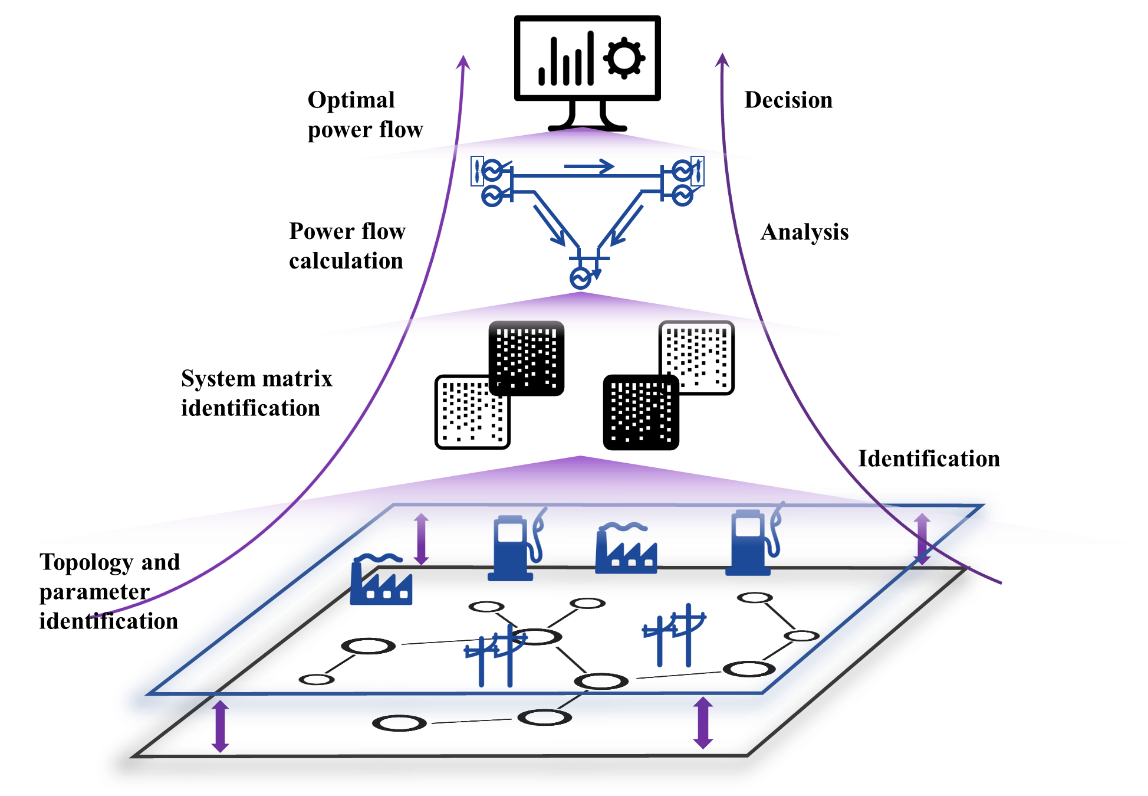 |
Power system probabilistic forecasting
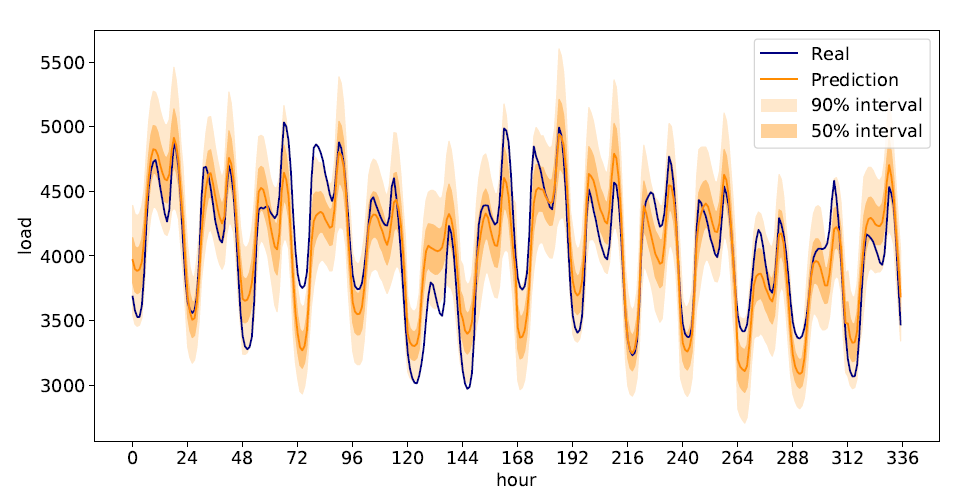 |
The integration of distributed renewable energy, distributed energy storage and the implementation of the demand response complicate the load patterns. A better understanding of these uncertainties will provide more information for power system planning and operation. We have carried out a series methodology of power system probabilistic forecasting, including individual consumer probabilistic load forecasting, net load forecasting with behind-meter-PV, probabilistic load forecasting for wind power and PV, and Probabilistic Load Forecasts combination.
Data driven power flow calculation
The linearization of a power flow (PF) model is an important approach for simplifying and accelerating the calculation of a power system's control, operation, and optimization. Traditional model-based methods derive linearized PF models by making approximations in the analytical PF model according to the physical characteristics of the power system. Today, more measurements of the power system are available and thus facilitate data-driven approaches beyond model-driven approaches. We propose a linearized PF model through a data-driven approach. Partial least squares (PLS)- and Bayesian linear regression (BLR)-based algorithms are designed to address data collinearity and avoid overfitting. The proposed approach is tested on a series of IEEE standard cases, which include both meshed transmission grids and radial distribution grids, with both Monte Carlo simulated data and public testing data. The results show that the proposed approach can realize a higher calculation accuracy than model-based approaches.
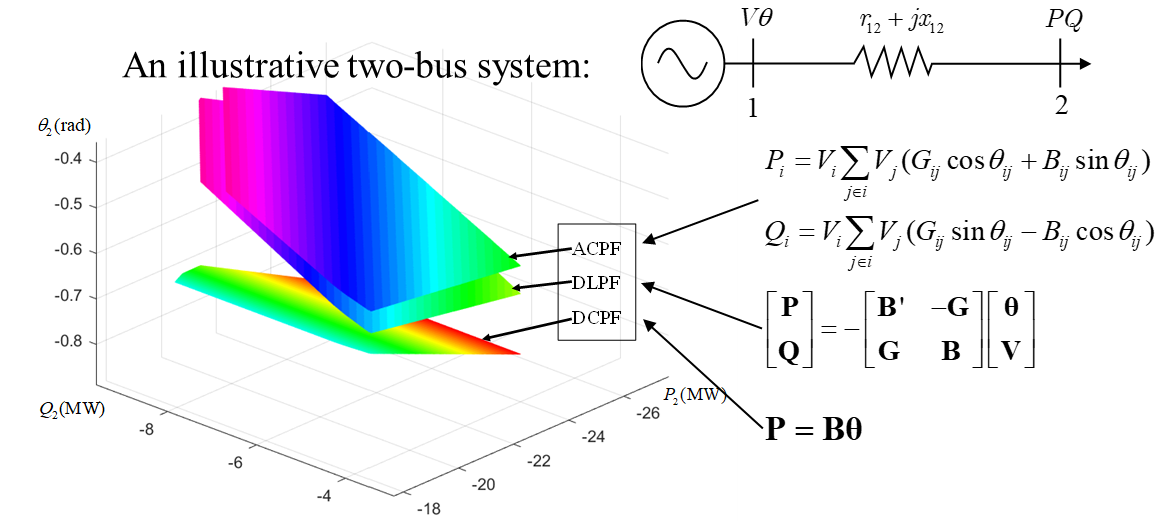 |
A visualization of a two-bus system. The power flow results show that: 1) The non-linear ACPF surface has a high degree of linearity 2) The two model-based linear approximations (DCPF and DLPF) still result in clear errors.
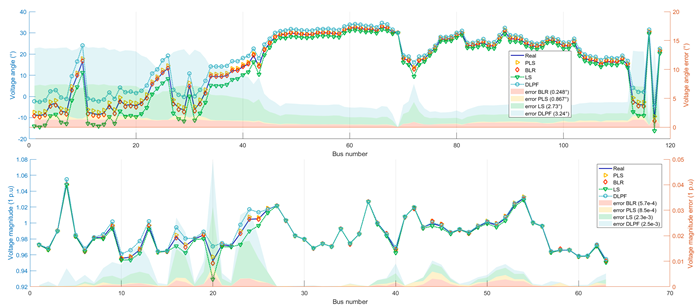 |
Calculation results of voltage angles and magnitudes of each bus for NREL-118 test system using different method. It is clear that the proposed algorithm performs better than both the LS and the DLPF algorithms, in terms of both the voltage angle and the voltage magnitude calculations, in almost every bus of the NREL-118 test system.
Data-driven topology identification
The energy management system becomes increasingly indispensable with the extensive penetration of new players in the distribution networks, such as renewable energy, storage, and controllable load. Also, the operation optimization of the active distribution system requires information on operation state monitoring. Smart measuring equipment enables the topology identification and branch line parameters estimation from a datadriven perspective. Nevertheless, many current methods require the nodal voltage angles measured by phasor measurement units (PMUs), which might be unrealistic for conventional distribution networks. This paper proposes a numerical method to identify the topology and estimate line parameters without the information of voltage angles. We propose a two-step framework: the first step applies a data-driven regression method to provide a preliminary estimation on the topology and line parameter; the second step utilizes a joint data-and-model-driven method, i.e., a specialized Newton-Raphson iteration and power flow equations, to calculate the line parameter, recover voltage angle and further correct the topology. We test the method on IEEE 33 and 123-bus looped networks with load data from 1000 users in Ireland. The results demonstrate that the proposed method can provide an accurate estimation of the topology and line parameters based on limited samples of measurement without voltage angles.
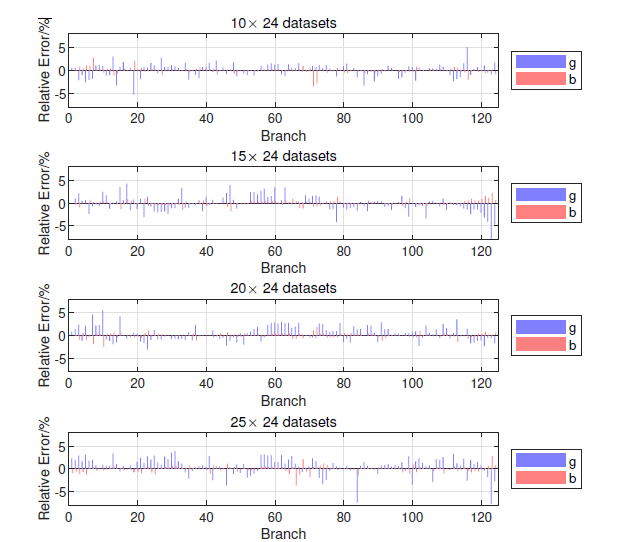 |
IEEE 123 bus feeder: g, b estimation error under different data size.
Data analytics in power system operation simulation
The introduction of highly penetrated renewable energy will make the power system operation mode highly diversified and variable. These modes may not follow traditional empirical patterns due to the inherent uncertainty of renewable energy generation. Specifically, the power system operation has abundant wide-area measurements, and an operation mode is generally depicted by the generator outputs, load demand, power flow, bus voltage, and phase angle. These data are inherently high-dimensional and complexly coupled to one another. Identifying the power system operation mode pattern is a typical big-data analytic problem. To this end, we propose a data-driven method based on high-dimensional power system operation data to identify the pattern of the operation modes and analyze the impact of high renewable penetration. The proposed data-driven method is composed of power system long-term and short-term simulation, preprocessing, clustering, dimension reduction, and visualization with the aim to provide an intuitive understanding of the operation mode variety under high renewable penetration. In addition, several indices are introduced to quantify the space dispersion, time variation, and seasonal consistency of operation modes. The effectiveness of the proposed data-driven method is validated on the actual Qinghai provincial power system in China. The results indicate that the dispersion and time variation of operation mode will significantly increase in the beginning and then saturate with the increase in renewable penetration level. The operation mode is less correlated with seasons in renewable energy dominated power system.
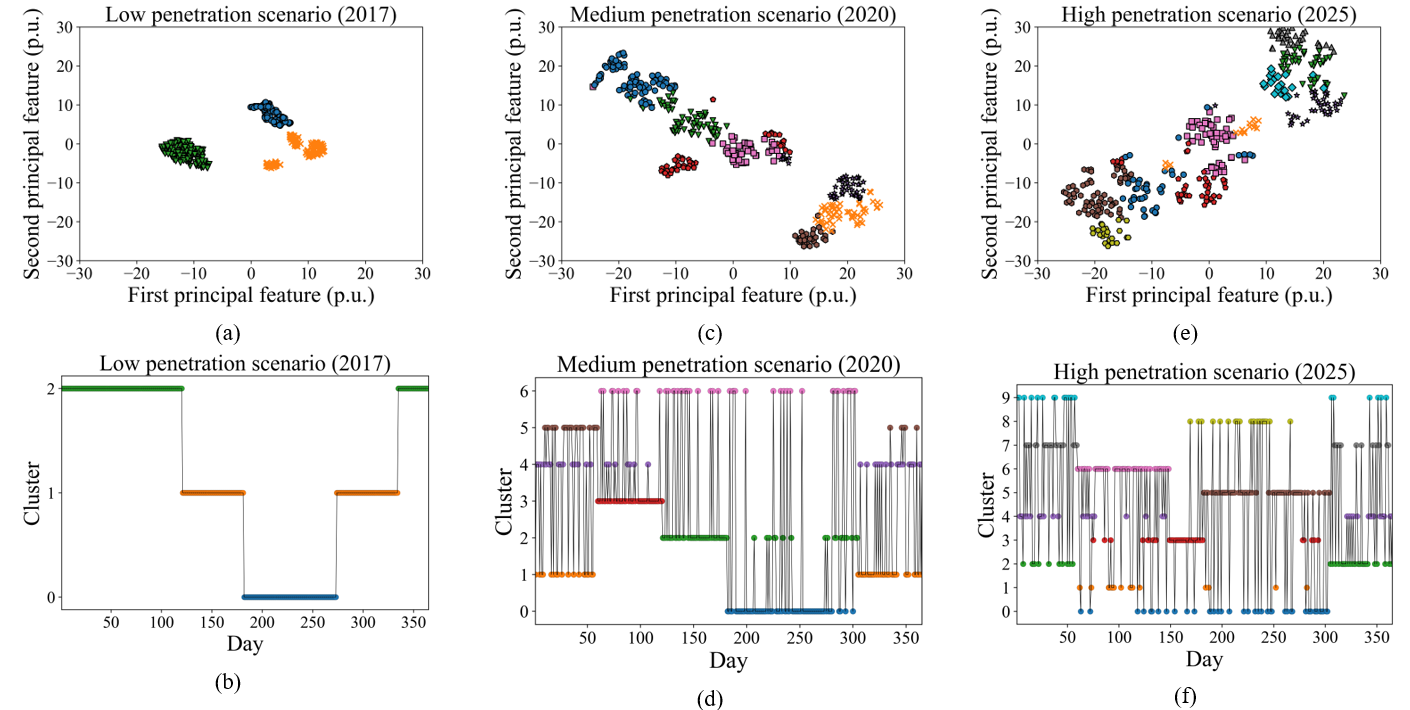 |
Visualization of the operation modes of the Qinghai power system in actual and planned scenarios (2017, 2020, 2025)
Related Publications:
Hongyi Wei, Wei Wang, Chen Fang, Yuxiao Liu, Ning Zhang, and Chongqing Kang, Online Distribution System Topology Monitoring With Limited Smart Meter Communication,“ in IEEE Transactions on Power Systems, doi: 10.1109/TPWRS.2022.3227904, 2023. ”Link"
Hai Li, Ning Zhang, Weihan Bao, Yue Fan, Ling Dong, and Pengcheng Cai. Modeling and Planning of Multi-Timescale Flexible Resources in Power Systems. CSEE Journal of Power and Energy Systems. accepted, in press, 2023. “Link”
Pei Yong, Ning Zhang, Qingchun Hou, Yuxiao Liu, and Chongqing Kang. Analytical Adequacy Evaluation for Power Consumers with UPS in Distribution Networks, IEEE Transactions on Smart Grid, 2022,13(6): 4424-4435. “Link”
Jiawei Zhang, Yi Wang, Mingyang Sun, and Ning Zhang, Two-Stage Bootstrap Sampling for Probabilistic Load Forecasting, IEEE Transactions on Engineering Management. 2022, 69(3): 720-728.
Kangping Li, Jichuan Yan, Lin Hu, Fei Wang, Ning Zhang, Two-stage Decoupled Estimation Approach of Aggregated Baseline Load under High Penetration of Behind-the-Meter PV System. IEEE Transactions on Smart Grid, 2021, 12(6), 4876-4885. “Link”
Jiawei Zhang, Peng Wang, Ning Zhang, Distribution Network Admittance Matrix Estimation with Linear Regression, IEEE Transactions on Power Systems, 2021, 36(5), 4896-4899. “Link”
Pei Yong, Ning Zhang, Qingchun Hou, Yuxiao Liu, Fei Teng, Song Ci, Chongqing Kang. Evaluating the Dispatchable Capacity of Base Station Backup Batteries in Distribution Networks. IEEE Transactions on Smart Grid. 2021, 12(5), 3966-3979. “Link”
Yuxiao Liu, Bolun Xu, Audun Botterud, Ning Zhang, and Chongqing Kang, Bounding Regression Errors in Data-driven Power Grid Steady-state Models, IEEE Transactions on Power Systems, 2021, 36(2), 1023-1033. doi: 10.1109/TPWRS.2020.3017684. “Link”
Yuxiao Liu, Ning Zhang, Dan Wu, Audun Botterud, Rui Yao, Chongqing Kang. Searching for Critical Power System Cascading Failures with Graph Convolutional Network. IEEE Transactions on Control of Network Systems, 2021, 8(3), 1304-1313. “Link”
Tianyi Li, Yi Wang, Ning Zhang. Combining Probability Density Forecasts for Power Electrical Loads. IEEE Transactions on Smart Grid, vol. 11, no. 2, pp. 1679-1690, March 2020, doi: 10.1109/TSG.2019.2942024. “Link”.
Jiawei Zhang, Yi Wang, Yang Weng, and Ning Zhang, Topology Identification and Line Parameter Estimation for non-PMU Distribution Network: A Numerical Method. IEEE Transactions on Smart Grid, 2020, 11(5): 4440-4453. “Link”
Yuxiao Liu, Yi Wang, Ning Zhang, Dan Lu, and Chongqing Kang, A Data-driven Approach to Linearize Power Flow Equations Considering Measurement Noise. IEEE Transactions on Smart Grid, 2020, 11(3): 2576-2587. “Link”
Yuxiao Liu, Yi Wang, Pei Yong, Ning Zhang, Chongqing Kang, and Dan Lu. Fast Power System Cascading Failure Path Searching with High Wind Power Penetration. IEEE Transactions on Sustainable Energy, accepted, in press. “Link”
Qingchun Hou, Ershun Du, Ning Zhang, Chongqing Kang, Impact of High Renewable Penetration on the Power System Operation Mode: A Data-Driven Approach. IEEE Transactions on Power Systems, 2020, 35(1): 731-741. “Link”
Yi Wang, Dahua Gan, Ning Zhang, Le Xie, and Chongqing Kang, Feature Selection for Probabilistic Load Forecasting via Sparse Penalized Quantile Regression. Journal of Modern Power Systems and Clean Energy, 2019:1-10.“Link”
Qingchun Hou, Ning Zhang, Ershun Du, Miao Miao, Fei Peng, Chongqing Kang, Probabilistic duck curve in high PV penetration power system: Concept, modeling, and empirical analysis in China. Applied Energy, 2019, 242: 205-215. “Link”
Yi Wang, Dahua Gan, Mingyang Sun, Ning Zhang, Zongxiang Lu, Chongqing Kang. Probabilistic individual load forecasting using pinball loss guided LSTM, Applied Energy, 2019, 235: 10-20. “Link”
Yi Wang, Ning Zhang, Yushi Tan, Tao Hong, Daniel Kirschen, and Chongqing Kang, Combining Probabilistic Load Forecasts, IEEE Transactions on Smart Grid,2019,10(4):3664-3674. “Link”
Yuxiao Liu, Ning Zhang, Yi Wang, Jingwei Yang and Chongqing Kang. Data-Driven Power Flow Linearization: A Regression Approach, IEEE Transactions on Smart Grid, 2019, 10(3):2569-2580. “Link”
Zhifang Yang, Kaigui Xie, Juan Yu, Haiwang Zhong, Ning Zhang and Qing Xia. A General Formulation of Linear Power Flow Models: Basic Theory and Error Analysis, IEEE Transactions on Power Systems, 2019,34(2):1315-1324. “Link”
Yi Wang, Qixin Chen, Ning Zhang and Yishen Wang. Conditional residual modeling for probabilistic load forecasting, IEEE Transactions on Power Systems, 2018, 33(6): 7327-7330. “Link”
Yi Wang, Ning Zhang, Qixin Chen, Daniel S. Kirschen, Pan Li and Qing Xia. Data-Driven Probabilistic Net Load Forecasting With High Penetration of Behind-the-Meter PV, IEEE Transactions on Power Systems, 2018, 33(3): 3255-3264. “Link”
Yi Wang, Ning Zhang, Chongqing Kang, Miao Miao, Rui Shi and Qing Xia. An Efficient Approach to Power System Uncertainty Analysis With High-Dimensional Dependencies, IEEE Transactions on Power Systems, 2018, 33(3): 2984-2994. “Link”
Jingwei Yang, Ning Zhang, Chongqing Kang and Qing Xia. A State-Independent Linear Power Flow Model with Accurate Estimation of Voltage Magnitude, IEEE Transactions on Power Systems, 2017, 32(5): 3607-3617. “Link”
Dahua Gan, Yi Wang, Ning Zhang and Wenjun Zhu. Enhancing short-term probabilistic residential load forecasting with quantile long-short-term memory, Journal of Engineering, 2017, 2017(14): 2622-2627. “Link”
Yi Wang, Ning Zhang, Hai Li, Jingwei Yang and Chongqing Kang. Linear three-phase power flow for unbalanced active distribution networks with PV nodes, CSEE Journal of Power and Energy Systems, 2017, 3(3): 321-324. “Link”
Ning Zhang, Chongqing Kang, Chanan Singh and Qing Xia. Copula Based Dependent Discrete Convolution for Power System Uncertainty Analysis, IEEE Transactions on Power Systems, 2016, 31(6): 5204-5205. “Link”
Qianyao Xu, Ning Zhang, Chongqing Kang, Qing Xia, Dawei He, Chun Liu, Yuehui Huang, Lu Cheng and Jianhua Bai. A Game Theoretical Pricing Mechanism for Multi-Area Spinning Reserve Trading Considering Wind Power Uncertainty, IEEE Transactions on Power Systems, 2016, 31(2): 1084-1095. “Link”
Qianyao Xu, Dawei He, Ning Zhang, Chongqing Kang, Qing Xia, Jianhua Bai and Junhui Huang. A short-term wind power forecasting approach with adjustment of numerical weather prediction input by data mining, IEEE Transactions on Sustainable Energy, 2015, 6(4): 1283-1291. “Link”
Ning Zhang, Chongqing Kang, Qing Xia and Ji Liang. Modeling conditional forecast error for wind power in generation scheduling, IEEE Transactions on Power Systems, 2014, 29(3): 1316-1324. “Link”